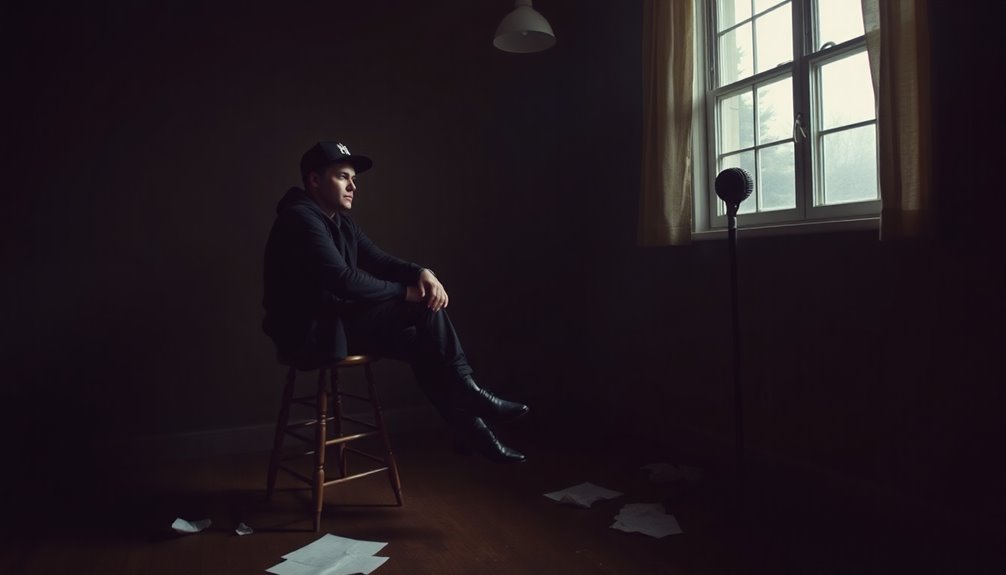Aaron Carter's life was a whirlwind of fame and personal battles. Born on December 7, 1987, in Tampa, Florida, he captured hearts as a child star, hitting it big with catchy tunes like "I Want Candy." By 18, he had over $200 million in earnings but struggled with mental health issues, including anxiety and depression. His tragic passing on November 5, 2022, shocked many, leaving a lasting impact on pop culture. Carter's legacy raises vital conversations about the pressures of early stardom. If you want to explore more about his journey and struggles, there's much more to uncover.
Key Takeaways
- Aaron Carter was born on December 7, 1987, in Tampa, Florida, and began his music career at age 7.
- He achieved pop stardom with hits like "I Want Candy" and "That's How I Beat Shaq" in the late 1990s.
- Carter earned over $200 million by age 18, becoming a teen pop icon who influenced many young artists.
- He faced significant mental health struggles, advocating for awareness while dealing with public speculation about his challenges.
- Tragically, Aaron Carter passed away at age 34 on November 5, 2022, with his death ruled an accidental drowning influenced by substances.
Introduction

Aaron Carter, born on December 7, 1987, in Tampa, Florida, burst onto the music scene at just seven years old. He began his career with the band Dead End and quickly transitioned to a solo act. By releasing his self-titled debut album in 1997, Aaron solidified his status as a pop star with hit singles like "I Want Candy" and "That's How I Beat Shaq." At just nine, he opened for his brother Nick Carter's band, the Backstreet Boys, which propelled him into the spotlight as a teen icon.
Throughout the late 1990s and early 2000s, Aaron blended pop, hip-hop, and dance music, influencing a generation of young artists and boy bands. However, his journey wasn't without struggles. Despite his success, Aaron faced significant challenges related to mental health and substance abuse. These personal battles sparked important conversations about the pressures child stars often endure.
Aaron Carter's legacy extends beyond his catchy tunes; it encapsulates the importance of addressing mental health issues in the entertainment industry. His story serves as a reminder of the complexities faced by those in the limelight, shaping both his career move and impact on future generations.
Child Star Turned Pop Icon
Many child stars struggle to transition into adulthood, but Aaron Carter defied the odds and became a pop icon. He launched his music career at just 7 years old as a member of the band Dead End, but it was his self-titled debut album released in 1997 that catapulted him to fame. By the late 1990s and early 2000s, you couldn't turn on the radio without hearing hits like "I Want Candy" and "That's How I Beat Shaq." These singles solidified his status as a teen pop icon.
At age 9, Aaron opened for his brother's group, the Backstreet Boys, marking a pivotal moment in his ascent within the entertainment industry. By 18, he had earned over $200 million from his flourishing music career and other ventures, showcasing his undeniable impact on the teen pop scene. His unique blend of pop, hip-hop, and dance music not only shaped the sound of the era but also inspired a generation of young artists and boy bands. Aaron Carter's influence remains a significant chapter in pop culture history, proving that with talent and determination, success is achievable.
Struggled With Mental Health Issues

Throughout his life, Aaron Carter grappled with significant mental health challenges, including multiple personality disorder, anxiety, and depression. He wasn't shy about discussing his struggles, using social media as a platform to advocate for awareness and support for others facing similar issues. Despite his openness, public speculation about his mental health only intensified during his battles with substance abuse, particularly in late 2019 when he was hospitalized for exhaustion.
Aaron faced a complex web of personal struggles, compounded by a family history of mental health issues. The tragic passing of his sister Leslie from an accidental drug overdose weighed heavily on him and added to his turmoil. His ongoing battle with anxiety and the toll it took on his life was evident to those who followed his journey.
Ultimately, Aaron's tragic passing at just 34 years old was attributed to drowning, but it was revealed that contributing factors included the presence of alprazolam, a medication often prescribed for anxiety disorders. His life serves as a poignant reminder of the importance of mental health awareness and the impact of substance abuse on individuals and their loved ones.
Frequently Asked Questions

When it comes to Aaron Carter's life and career, fans often have numerous questions about his journey, struggles, and achievements. One common question is how his relationship with his older brother Nick Carter of the Backstreet Boys influenced his career. Growing up in a musical household, Aaron began his music career at just seven years old, eventually releasing a self-titled debut album in 1997 that achieved gold status.
Another frequently asked question revolves around Aaron's struggles with mental health issues and drug use. Despite earning over $200 million by age 18, he faced significant personal challenges that led to multiple rehab stints. His tragic passing on November 5, 2022, at the age of 34, shocked fans, as the cause of death was ruled drowning influenced by substance use.
Mental Health Support Resources

Accessing mental health support resources is crucial for anyone grappling with challenges like anxiety, depression, or substance use. If you or someone you know is struggling, remember that you're not alone. Organizations like the National Alliance on Mental Illness (NAMI) offer invaluable education, advocacy, and support for individuals and families affected by mental health disorders. They can help you understand your situation better and guide you toward effective treatment options.
The Substance Abuse and Mental Health Services Administration (SAMHSA) provides a national helpline that operates 24/7, offering free and confidential treatment referral and information services. This is a great resource if you're seeking help for addiction or mental health issues.
If you're in immediate crisis, the Crisis Text Line is available 24/7 for anyone needing support. You can reach out via text to connect with trained crisis counselors who can provide the assistance you need. Remember, mental health awareness campaigns are working hard to reduce stigma and encourage individuals to seek help. Recognizing that asking for support is a sign of strength can be the first step toward healing and recovery. Don't hesitate to reach out!
Conclusion

How can we truly understand the complex legacy left by Aaron Carter? His journey as a child star in the music industry showcased immense talent and charisma, captivating audiences in the late 1990s and early 2000s. However, this fame came at a cost, as he battled significant mental health issues and addiction. His untimely death on November 5, 2022, ignited vital conversations about the pressures faced by child stars and the importance of mental health awareness.
Carter's legacy is multifaceted; while he influenced a generation of young artists, his struggles serve as a cautionary tale about the darker side of fame. The estate he left behind, valued at approximately $550,000, underscores the critical need for proper estate planning. Without a plan in place, complications arose under California intestate succession law, highlighting the importance of preparing for life's uncertainties.
As we reflect on Aaron Carter's life, we remember both his contributions to music and the lessons learned from his challenges. His story reminds us to prioritize mental health and advocate for those who face similar battles, ensuring that his legacy endures beyond his time in the spotlight.
Frequently Asked Questions
Did Nick Carter Go to Aaron Funeral?
Yes, Nick Carter attended Aaron's funeral on November 24, 2022, in Los Angeles. He expressed his love and heartache during the service, emphasizing family bonds amidst the emotional impact of Aaron's passing.
What Did Aaron Carter Pass Away Of?
Aaron Carter passed away due to drowning, with contributing factors being alprazolam and difluoroethane in his system. His struggles with substance abuse and mental health issues highlighted the challenges many face in similar situations.
Who Did Aaron Carter Have a Son With?
Aaron Carter had a son, Prince Lyric Carter, with his ex-fiancée Melanie Martin. They faced ups and downs during their relationship, but Aaron committed to being a father and valued family despite his struggles.
Who Was Aaron Carter Engaged To?
Aaron Carter was engaged to Melanie Martin. Their relationship had ups and downs, including personal struggles, but he expressed his commitment to family. Despite challenges, they welcomed their son, Prince, shortly before his passing.










